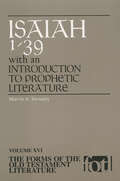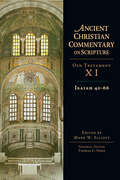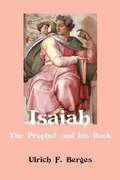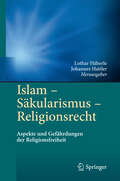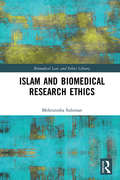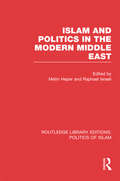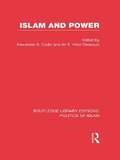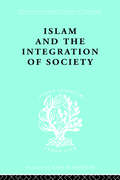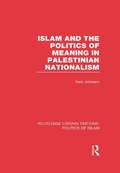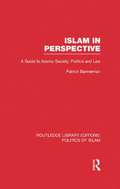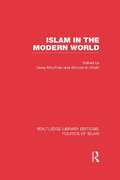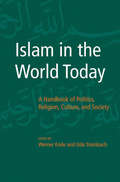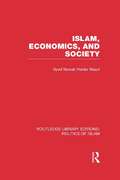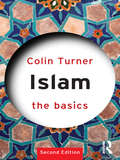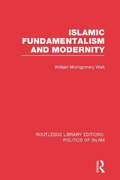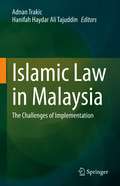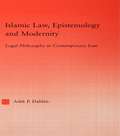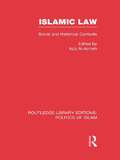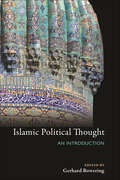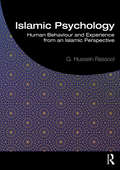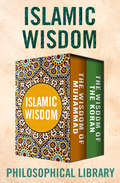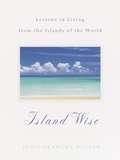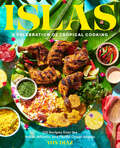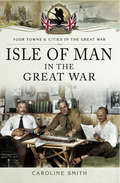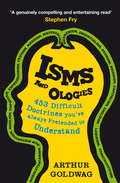- Table View
- List View
Isaiah 1-39: An Introduction to Prophetic Literature
by Marvin A. SweeneyIsaiah 1 -39, by Marvin A. Sweeney, is volume XVI of The Forms of the Old Testament Literature, a series that aims to present a form- critical analysis of every book and each unit in the Hebrew Bible. Fundamentally exegetical, the FOTL volumes examine the structure, genre, setting, and intention of the biblical literature in question. They also study the history behind the form-critical discussion of the material, attempt to bring consistency to the terminology for the genres and formulas of the biblical literature, and expose the exegetical procedure so as to enable students and pastors to engage in their own anlysis and interpretation of the Old Testament texts.
Isaiah 40-66 (Ancient Christian Commentary on Scripture #11)
by Mark W. ElliottNo book of the Old Testament is more frequently quoted in the New than Isaiah, and no portion of Isaiah is more frequently quoted in the New than the typologically fertile soil of Isaiah 40-66. Still, as interpreted by the fathers, Isaiah presents a message that is far more soteriological than christological, leading readers to a deeper understanding of God's judgment and salvation. Isaiah 40-66 provides us with the closest thing the Old Testament has to offer regarding a systematic theology. The excerpts included in this volume offer us a rich array of differing styles, principles and theological emphases from Theodoret of Cyr to Eusebius and Procopius, to Cyril of Alexandria, Jerome and Augustine. Readers will be enriched by the wide-ranging selections, some of which are translated here into English for the first time.
Isaiah: The Prophet and His Book
by Ulrich F. BergesIn this developed theology of history, Isaiah is portrayed neither as a writing prophet nor a prophetic writer, but rather as the man who saw the vision of Judah and Jerusalem in the days of Uzziah.
Islam - Säkularismus - Religionsrecht
by Lothar Häberle Johannes HattlerSeit Gründung der Bundesrepublik ist die religiöse Zusammensetzung der Gesellschaft heterogener und konfliktreicher geworden: Zugenommen hat die Gruppe der Religionslosen, von denen einige aktiv für einen weltanschaulichen Säkularismus eintreten, und die der Muslime unterschiedlichen Bekenntnisses. Dem Islam selbst und seiner komplexen Beziehung zum Verfassungsstaat sind zwei Beiträge gewidmet, ein weiterer säkularistischen (bzw. laizistischen) Positionen. Mehrere Kapitel gehen der Frage nach, wie das staatliche Religionsrecht auf die Herausforderungen Islam und Säkularismus reagieren sollte und ob es einer Neujustierung bedarf. Abschließend werden zwei konträre Urteile des Europäischen Gerichtshofs für Menschenrechte (EGMR) zu einem italienischen Schulkreuz-Fall analysiert.
Islam and Biomedical Research Ethics (Biomedical Law and Ethics Library)
by Mehrunisha SulemanThis book is a contribution to the nascent discourse on global health and biomedical research ethics involving Muslim populations and Islamic contexts. It presents a rich sociological account about the ways in which debates and questions involving Islam within the biomedical research context are negotiated - a perspective which is currently lacking within the broader bioethics literature. The book tackles some key understudied areas including: role of faith in moral deliberations within biomedical research ethics, the moral anxiety and frustration experienced by researchers when having to negotiate multiple moral sources and how the marginalisation of women, the prejudice and abuse faced by groups such as sex workers and those from the LGBT community are encountered and negotiated in such contexts. The volume provides a valuable resource for researchers and scholars in this area by providing a systematic review of ethical guidelines and a rich case-based account of the ethical issues emerging in biomedical research in contexts where Islam and the religious moral commitments of Muslims are pertinent. The book will be essential for those conducting research in low and middle income countries that have significant Muslim populations and for those in Muslim-minority settings. It will also appeal to researchers and scholars in religious studies, social sciences, philosophy, anthropology and theology, as well as the fields of biomedical ethics, Islamic ethics and global health..
Islam and Politics in the Modern Middle East (Routledge Library Editions: Politics of Islam)
by Metin Heper Raphael IsraeliThe recent resurgence of Islam in the Middle East is a far more complex phenomenon than is often suggested by those analyses which reduce recent developments in the area to no more than an intensification of religiosity. Islam and Politics in the Modern Middle East challenges that perception of the contemporary Middle East. It explores the nature of the Islamic revival and attempts to establish the original impulse behind particular instances of Islamic resurgence. It also examines the degree to which religious institutions have served as a mechanism for expressing secular demands and frustrations and investigates to what extent politics is a functional alternative to religion. First published in 1984.
Islam and Power (Routledge Library Editions: Politics of Islam)
by Alexander S. Cudsi and Ali E. Hillal DessoukiThe 1970s witnessed a mushrooming of Islamic movements and ideas which was described variously as Islamic revival, Islamic resurgence and Islam on the march. Whether as part of the majority or minority, whether under capitalist or socialist regimes, Muslims have been moved by this reawakening. But what really are the causes and nature of this Islamic resurgence? Is it a purely religious revival? Or is it a social and political movement that must be understood in the context of the Muslim’s conditions and milieu? Will it really lead to the establishment of an Islamic socio-political order or will it end up as an instrument of struggle between Muslim ruling elites and their opposition? And what are the foreign policy implications of these developments? Do they necessarily lead to a more militant and hostile attitude towards the West? These questions and more are tackled by the contributors to Islam and Power. First published in 1981.
Islam and the Integration of Society (International Library of Sociology)
by Prof W Watt W. Montgomery WattThs book is one of the most important to explore the formation of Islamic thought and civilisation. William Montgomery Watt made an outstanding contribution to Islamic scholarship.
Islam and the Politics of Meaning in Palestinian Nationalism (Routledge Library Editions: Politics of Islam)
by Nels JohnsonThe intention of this book is to explore the relationship between an ideological idiom and the changing social movement in which it operates. The basic question is that of what roles an Islamic symbol complex played in different phases of the Palestinian nationalist movement, and what were the socio-economic factors which help to explain, and are themselves partially explained by, the appearance of these roles. Islam was ideologically ‘appropriate’ at different stages in the development of the movement, and this study examines in what way, and why. First published in 1982.
Islam in Perspective: A Guide to Islamic Society, Politics and Law (Routledge Library Editions: Politics of Islam)
by Patrick BannermanThere has been a significant upsurge of western interest in the political manifestations and significance of Islam in the last decade, fuelled by the notion of Islamic ‘revival’, the Iranian revolution and by events in countries as diverse as Egypt, Pakistan and Sudan. Oil power and its effect on the international economic order, the relationship of Muslim countries with the superpowers and the continuation of the Arab-Israeli conflict have also served to focus attention on Islamic politics and, in particular, on the notion of Islamic reassertion. As the author of this book argues, one result of this interest has been the development of a view of Islam as monolithic and implacable. He takes a broad view of the intellectual and cultural history of Islam, emphasising the extraordinary diversity of Islamic societies and the ways in which the ideal is often pragmatically adapted to reality. In this wider social and historical context, the nature of Islamic revival is then reassessed. First published in 1988.
Islam in the Modern World (Routledge Library Editions: Politics of Islam)
by Denis Maceoin Ahmed Al-ShahiIn recent years, events in the Islamic world have captured the attention of the West to an unprecedented degree. However, much of the media coverage of events like the Islamic revolution in Iran has merely reinforced current prejudices and misconceptions about Islam. This collection of essays, by specialists in a variety of disciplines, gives an impressionistic overview of contemporary Islam. Different areas of Islamic life are singled out for special attention; these include the problem of relations between Islam and the West, the role of the Sufi orders and the revival of religious fundamentalism, Islam and the feminine, Islamic economics and Islamic architecture. Geographically, the essays cover a wide area, ranging over Sudan, Turkey, Iran, Egypt and Saudi Arabia. Each discussion should appeal to the layman and specialist alike and collectively they bring together a comprehensive range of material not often covered in one volume. Above all, they cut across the stereotypes of Islam found in the popular media, to reveal facets of a complex, living tradition often unsuspected in the West. First published in 1983.
Islam in the World Today: A Handbook of Politics, Religion, Culture, and Society
Considered the most authoritative single-volume reference work on Islam in the contemporary world, the German-language Der Islam in der Gegenwart, currently in its fifth edition, offers a wealth of authoritative information on the religious, political, social, and cultural life of Islamic nations and of Islamic immigrant communities elsewhere. Now, Cornell University Press is making this invaluable resource accessible to English-language readers. More current than the latest German edition on which it is based, Islam in the World Today covers a comprehensive array of topics in concise essays by some of the world's leading experts on Islam, including:• the history of Islam from the earliest years through the twentieth century, with particular attention to Sunni and Shi'i Islam and Islamic revival movements during the last three centuries;• data on the advance of Islam along with current population statistics;• Muslim ideas on modern economics, on social order, and on attempts to modernize Islamic law (shari'a) and apply it in contemporary Muslim societies;• Islam in diaspora, especially the situation in Europe and America;• secularism, democracy, and human rights; and• women in IslamTwenty-four essays are each devoted to a specific Muslim country or a country with significant Muslim minorities, spanning Asia, Africa, the Middle East, and the former Soviet Union. Additional essays illuminate Islamic culture, exploring local traditions; the languages and dialects of Muslim peoples; and art, architecture, and literature. Detailed bibliographies and indexes ensure the book's usefulness as a reference work.
Islam, Economics, and Society: Politics Of Islam: Islam, Economics, And Society (Routledge Library Editions: Politics of Islam)
by Syed Nawab Haider NaqviThe Islamic perception of the socio-economic process is dynamic and its insistence on social justice is uncompromising. To produce the best social structure, according to this view, man’s economic endeavours should be motivated by a meaningful moral philosophy. In the face of the challenges presented by the modern world, the practice of Islamic economics raises many complex and profound issues. These are addressed in this highly important work, which must be considered essential reading for all those who live in the vision of the ‘right’. First published in 1994.
Islam: The Basics (The Basics)
by Colin TurnerNow in its second edition, Islam: The Basics provides an introduction to the Islamic faith, examining the doctrines of the religion, the practises of Muslims and the history and significance of Islam in modern contexts. Key topics covered include: the Qur'an and its teachings the life of the Prophet Muhammad gender, women and Islam Sufism and Shi’ism Islam and the western world non-Muslim approaches to Islam. With updated further reading, illustrative maps and an expanded chronology of turning points in the Islamic world, this book is essential reading for students of religious studies and all those new to the subject of Islam.
Islamic Fundamentalism and Modernity: Politics Of Islam: Islamic Fundamentalism And Modernity (Routledge Library Editions: Politics of Islam)
by William Montgomery WattIslam is a burning topic in modern scholarship and contemporary world affairs. It is a subject poorly understood by Western observers, and in this book Professor Montgomery Watt takes a significant step towards its demystification. Montgomery Watt examines the crucial questions of traditional world-view and self-image which dominate the thinking of Muslims today. This traditional self-image causes them to perceive world events in a different perspective from Westerners – a fact not always appreciated by the foreign ministries of Western powers. Professor Watt presents a brilliant and critical analysis of the traditional Islamic self-image, showing how it distorts Western modernism and restricts Muslims to a peripheral role in world affairs. In a scholarly and incisive way, he traces this harmful image to its origins in the medieval period and then to the traumatic exposure of Muslims to the West in modern times. He argues that Muslim culture is suffering from a dangerous introspection, and in his closing chapters presents a constructive criticism of contemporary Islam, aimed at contributing to a truer, more realistic Islamic self-image for today. First published in 1988.
Islamic Law in Malaysia: The Challenges of Implementation
by Adnan Trakic Hanifah Haydar Ali TajuddinThis book examines the challenges of the implementation of Islamic law in Malaysia. Malaysia is a pertinent jurisdiction to explore such challenges given its global focus, colonial history and institutions, and the intersection of the Shari’ah and secularism/multiculturalism. The resultant implementation challenges are underpinned by three factors that make Malaysia an important jurisdiction for those interested in understanding the place of Islamic law in the global context. First, Malaysia is often considered as a model Islamic country. Islamic law is a source of law in Malaysia. The Islamic law legal system in Malaysia operates in parallel with a common law legal system. The two systems of law generally are in harmony with one another. Nevertheless, occasional cross-jurisdictional issues do arise, and when they do, the Malaysian judiciary has been quite efficient in solving them. The Malaysian experience in maintaining such harmony between the two legal systems provides lessons for a number of countries facing such challenges. Second, Malaysia has a developed Shari’ah court system that interprets and applies Islamic law predominantly based on the Shafi’i school of thought. While, for the most part, the approach has been successful, there have been times when the implementation of the law has raised concerns as to the compatibility of Islamic law with modern principles of human rights and common law-based values. Third, there have been cases where Islamic law implementation in Malaysia has gained global attention due to the potential for wider international implications. To do justice to this complex area, the book calls on scholars and practitioners who have the necessary expertise in Islamic law and its implementation. As such, this book provides lessons and direction for other countries that operate a dual system of secular and Islamic laws.
Islamic Law, Epistemology and Modernity: Legal Philosophy in Contemporary Iran (Middle East Studies: History, Politics & Law)
by Ashk DahlenThis study analyses the major intellectual positions in the philosophical debate on Islamic law that is occurring in contemporary Iran. As the characteristic features of traditional epistemic considerations have a direct bearing on the modern development of Islamic legal thought, the contemporary positions are initially set against the established normative repertory of Islamic tradition. It is within this broad examination of a living legacy of interpretation that the context for the concretizations of traditional as well as modern Islamic learning, are enclosed.
Islamic Law: Social and Historical Contexts (Routledge Library Editions: Politics of Islam)
by Aziz Al-AzmehThis book underlines the mutability of Islamic law and attempts to relate its substantive and institutional varieties and transformations to social, political, economic and other historical circumstances. The studies in the book range from discussion of the received wisdom in Islamic law to studies of legal institutions and the theoretical means employed by Islamic law for the accommodation of changing historical circumstances. First published in 1988.
Islamic Political Thought: An Introduction
by Gerhard BoweringA concise and authoritative introduction to Islamic political ideasIn sixteen concise chapters on key topics, this book provides a rich, authoritative, and up-to-date introduction to Islamic political thought from the birth of Islam to today, presenting essential background and context for understanding contemporary politics in the Islamic world and beyond. Selected from the acclaimed Princeton Encyclopedia of Islamic Political Thought, and focusing on the origins, development, and contemporary importance of Islamic political ideas and related subjects, each chapter offers a sophisticated yet accessible introduction to its topic. Written by leading specialists and incorporating the latest scholarship, the alphabetically arranged chapters cover the topics of authority, the caliphate, fundamentalism, government, jihad, knowledge, minorities, modernity, Muhammad, pluralism and tolerance, the Qur'an, revival and reform, shari?a (sacred law), traditional political thought, ‘ulama' (religious scholars), and women. Read separately or together, these chapters provide an indispensable resource for students, journalists, policymakers, and anyone else seeking an informed perspective on the complex intersection of Islam and politics.The contributors are Gerhard Bowering, Ayesha S. Chaudhry, Patricia Crone, Roxanne Euben, Yohanan Friedmann, Paul L. Heck, Roy Jackson, Wadad Kadi, John Kelsay, Gudrun Krämer, Ebrahim Moosa, Armando Salvatore, Aram A. Shahin, Emad El-Din Shahin, Devin J. Stewart, SherAli Tareen, and Muhammad Qasim Zaman.A new afterword discusses the essays in relation to contemporary political developments.
Islamic Psychology: Human Behaviour and Experience from an Islamic Perspective
by G. Hussein RassoolIslamic Psychology or ilm an-nafs (science of the soul) is an important introductory textbook drawing on the latest evidence in the sub-disciplines of psychology to provide a balanced and comprehensive view of human nature, behaviour and experience. Its foundation to develop theories about human nature is based upon the writings of the Qur'an, Sunna, Muslim scholars and contemporary research findings. Synthesising contemporary empirical psychology and Islamic psychology, this book is holistic in both nature and process and includes the physical, psychological, social and spiritual dimensions of human behaviour and experience. Through a broad and comprehensive scope, the book addresses three main areas: Context, perspectives and the clinical applications of applied psychology from an Islamic approach. This book is a core text on Islamic psychology for undergraduate and postgraduate students and those undertaking continuing professional development in Islamic psychology, psychotherapy and counselling. Beyond this, it is also a good supporting resource for teachers and lecturers in this field.
Islamic Wisdom: The Wisdom of Muhammad and The Wisdom of the Koran (Wisdom)
by Philosophical LibraryAn inspirational anthology that draws on sacred texts to provide essential insight into Islam, one of the world&’s great religions.The Wisdom of Muhammad: This compelling examination of the life and sayings of Muhammad offers the modern reader a guide to the history and principles of the world&’s second largest religion. Covering a diverse range of topics, from marriage and civic charity to the individual&’s relationship to God and the afterlife, the Prophet&’s words dispel misconceptions about Islam and its teachings. The Wisdom of the Koran: Representing the ultimate authority on almost every issue in Muslim life, the Koran&’s lessons and parables offer moral and spiritual guidance to the faithful. In this essential guide, readers learn about key chapters such as &“The Night Journey&” and &“The Cave&” as well as several stories from Judeo-Christian history.
Island Wise
by Janis Frawley-HollerMany of us long to escape the dreariness of our daily lives for the balmy weather, fresh air, and bright sunshine of the world’s islands—those almost magical places whose distance from the mainland has the power to distance us from our normal cares. Island Wisetransports you to these far-off shores to reveal what makes island life so appealing—and shows you how to invoke the inimitable island sense of tranquility, simplicity andjoie de vivreevery day. From the Bahamas to Prince Edward Island, Canada, author Janis Frawley-Holler explores twenty-five of the world’s most beguiling islands, introducing the natural wonders, ancient traditions, musical rhythms, and everyday practices that make each seaborne locale utterly unique. Her charming vignettes also share each culture’s simple recipes for leading life at a slower pace, focusing on what really matters, charting your heart’s desires, enriching personal relationships, and cultivating a deep sense of purpose and meaning. Whether you’re dreaming of an island getaway or looking to retain your post-vacation glow,Island Wiseproves that “island-wise” living is not about location—it’s simply a state of mind that makes life sweeter wherever you are. Jamaica • Borneo • Prince Edward Island • Nassau • Crete • Anegada • Key West, Florida • Sark • St. Honorat • Oahu, Hawaii • Hong Kong • Santa Catalina Island, California • Likiep Atoll • Isla Santa Magdalena, Baja California • Chincoteague Island, Virginia • Terceira • Cuba • Baranoff Island, Alaska • Taha’a • Jost Van Dyke • The Galapagos Islands • St. Lucia • Sjaelland • Seguin Island, Maine • Bimini From the Trade Paperback edition.
Islas: A Celebration of Tropical Cooking—125 Recipes from the Indian, Atlantic, and Pacific Ocean Islands
by Von DiazFood & Wine Best Cookbooks of 2024 • Bon Appetit Best Cookbooks of 2024 An intimate reflection on tropical island cooking's bold flavors and big stories, with 125 recipes, from celebrated food writer Von Diaz.The islands spanning the Indian, Atlantic, and Pacific Oceans are remarkable places, sharing dozens of ingredients and cooking techniques, including marinating, pickling and fermentation, braising and stewing, frying, grilling and smoking, and steaming and in-ground roasting. Bold flavors drip from the edges of each dish with tastes that represent stories of resistance, persistence, and wisdom passed down from generation to generation.This narrative cookbook by writer, documentary producer, and author Von Diaz travels across oceans and nations to uplift the shared ancestral cooking techniques of these islands in more than 125 recipes, including intimate profiles of the historical context of each technique, stories from islanders, and step-by-step guides for recreating them at home.Recipes include: Coco Bread from JamaicaArroz con Jueyes (Stewed Crab Rice) from Puerto RicoMasikita (Papaya-Marinated Beef Skewers) from MadagascarBebek Betutu (Roasted Duck in Banana Leaf) from Indonesia Lechon Kawali (Crispy Fried Pork Belly) from the PhilippinesBright citrus and vinegars, verdant herbs, slow-cooked and smoky grilled meats, fresh seafood, aromatic rice, and earthy root vegetables: These flavors, found in the meals and recipes across these island nations pair remarkably well together, despite distance and cultural differences. The ingredients and deep-rooted cooking techniques in each of these recipes typify the harmonious, synchronous spirit found in each culture's unique cuisines. Even amid environmental chaos and food insecurity, islanders cook in ways that are soul nourishing and flavorful.Islas is about preserving the wisdom, values, and resilience of the people who live in some of the most volatile, vulnerable places on this planet. Each recipe, an archive of strategies for persistence, creativity, and ingenuity, provides a path for cooking delicious food. But above all, these stories and recipes acknowledge that cooking delicious food for others is always a selfless act.AN AUTHENTIC DEEP DIVE INTO UNDERREPRESENTED FOODWAYS: Amid environmental chaos and food insecurity, and with limited ingredients, islanders cook in ways that are soul nourishing and emphasize flavor. This book expertly and authentically presents the diverse recipes and techniques of the islands of the Indian, Atlantic, and Pacific Oceans. DETAILED RECIPES AND FULL-COLOR PHOTOGRAPHS: Each of the techniques and recipes are paired with lots of how-tos and step-by-step guides, including key historical and scientific background to help you master these delicious recipes—from quick pickles to soups, stews, and barbecues—at home. EXPERT AUTHOR AND A LEADING VOICE: Von Diaz is a celebrated author and seasoned food researcher who has dedicated her life to bringing forth unique food stories and the people behind them.Perfect for:Anyone interested in learning more about AAPI cooking and cuisineA great hostess gift or self-purchase for those who enjoy entertaining and exploring food cultures around the worldAn educational and practical resource for sustainable cooking enthusiasts Special occasion, holiday, or birthday present for foodies and cookbook collectors Those who enjoy Salt, Fat, Acid, Heat; Coconut & Sambal; Cook Real Hawai'i; and Ottolenghi cookbooks
Isle of Man in the Great War (Your Towns & Cities in the Great War)
by Caroline SmithIn August 1914, the Isle of Man was in the middle of a very successful summer season. The tourist industry was crucial to the island, but suddenly holiday-makers left and the Steam Packet vessels that normally brought them were requisitioned. The future was uncertain for those who relied on the season and their pleas for assistance were ignored. For some, the cost of living became impossibly high and without the welfare measures that had been brought about in Britain, many faced destitution. Others however, particularly farmers and those involved with the internment camps, would find war very profitable. The divisions between rich and poor grew creating much social disaffection and a bitter battle for reform was fought. As arguments raged over conscription, taxation, the economy and the housing of enemy aliens, the personalities of the period came to prominence. The unprecedented scenes of direct action and several dramatic court cases are brought to life in this account of how the island began its path to progress.The Isle of Man played an important role in World War One, supplying troops and vessels and running special camps for the internment of enemy. 8,261 men enlisted in the armed forces, which was 82.3% of the Isle of Man's male population of military age. Of these, 1,165 gave their lives and 987 were wounded.The experience of war significantly impacted on the Island, from the initial enthusiasm for sorting out the German Kaiser in time for Christmas 1914, to the gradual realization of the enormity of human sacrifice the families of the Isle were committed to as the war stretched out over the next four years. The Great War affected everyone. At home there were wounded soldiers in military hospitals, refugees from Belgium and later on German prisoners of war. There were food and fuel shortages and disruption to schooling. The role of women changed dramatically and they undertook a variety of work undreamed of in peacetime. Extracts from contemporary letters reveal their heroism and give insights into what it was like under battle conditions.
Isms and Ologies: 453 Difficult Doctrines You've Always Pretended to Understand
by Arthur Goldwag Goldwag ArthurWhat's the difference between an anarchist and an anarcho-syndicalist, a Platonist and a Neo-Platonist? And how modern can Modernism really be if all the famous modernists are dead? To those who've been humiliated by a knowing reference to Wahhabism at a dinner party, caught short by a casual allusion to Orphism at a private view, or flummoxed by a smug mention of post-structuralism by a fellow member of a suburban book group, Isms and Ologies offers hope and enlightenment. Crackpot convictions, perplexing philosophies, tricky tenets, and wacky Weltanschauungs - Isms and Ologies lists them all, and explains their salient features clearly and accessibly. So, if you're genuinely curious to know the crucial characteristics of phenomenology or just want to lend a veneer of intellectual rigour to your small talk, Isms and Ologies could be just the book you are looking for.
